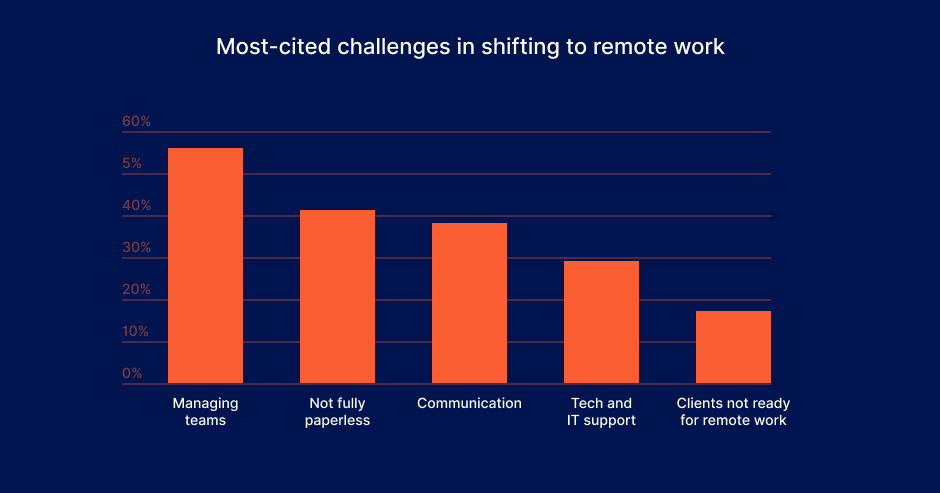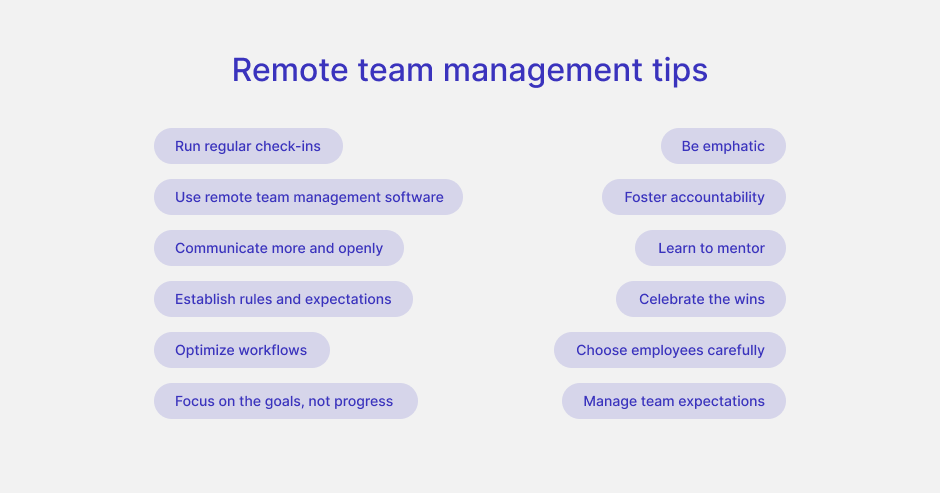As of August 2023, around 13% of full-time workers were entirely remote, 57% worked full-time on-site, and 30% had a mix of remote and in-person work. Forbes predicts that by 2025, 70% of employees will work from home for at least five days a month. This highlights the growing importance of managing remote teams effectively.
Most-cited challenges in shifting to remote work
To support this shift, we've compiled the top 10 best practices for managing remote software engineers. These practices aim to enhance employee productivity and efficiency. Let's explore these strategies to help you effectively oversee remote teams.
1. Establish Clear Communication Channels
Open and transparent communication is essential for remote team success. It helps build trust, ensures everyone is on the same page, and fosters a sense of camaraderie. There are various communication tools and platforms available, including email, instant messaging, video conferencing, and project management software. Each tool has its strengths, so using a combination of them can enhance team communication.
It's also crucial to establish communication guidelines and protocols. These may include setting expectations for response times, specifying preferred communication channels for different types of messages, and encouraging regular updates on projects. By implementing these guidelines, remote teams can maintain strong communication and work together effectively, regardless of their location.
Also read: How to Build an Effective Development Team: 10 Strategies
2. Set Clear Expectations and Goals
When employers set clear goals and expectations for their employees, those employees are 2.8 times more likely to be highly engaged. For remote teams to work effectively, it is essential to define team objectives and individual responsibilities. This provides a clear roadmap for everyone, ensuring that each team member understands their role and what is expected of them. By outlining these expectations, managers can prevent confusion and miscommunication, leading to more efficient teamwork.
Setting realistic deadlines and tracking progress is also a crucial aspect of managing remote teams. This helps keep team members accountable and motivated, knowing they have targets to meet. Project management tools can be particularly useful in tracking progress, as they provide a visual representation of tasks and deadlines, ensuring that everyone is working towards a common goal.
Clear expectations not only improve productivity but also enhance team morale. When everyone knows what is expected of them, they can focus on their work with confidence and feel a sense of achievement as they complete tasks and contribute to the team's success. Ultimately, setting clear expectations and goals is a vital component of effective remote team management.
3. Provide the Right Tools and Technology
Equipping remote teams with the necessary tools is crucial for their success. By providing a set of essential tools, you can ensure that your team members have everything they need to collaborate, communicate, and work efficiently. Some of the most critical tools for remote work include project management software, communication apps, and file-sharing platforms. These tools enable your team to stay connected, organized, and productive, regardless of their physical location.
Index.dev is a platform designed to help companies scale remote software teams and streamline hiring and management processes. By connecting companies with top software engineers from around the world, Index.dev provides access to a global talent pool, offering increased flexibility in team scaling and simplifying payroll and compliance processes. By leveraging the tools and technology provided by Index.dev, companies can successfully build and manage distributed teams, overcoming the challenges of remote work and driving their teams towards success.
Also read: 18 indispensable productivity tools for remote & distributed development teams
4. Encourage Regular Check-ins and Team Meetings
Maintaining team cohesion and accountability is essential for the success of remote teams. Regular check-ins play a significant role in achieving this, as they allow managers and team members to stay connected, discuss ongoing projects, and address any issues that may arise. Striking a balance between formal and informal communication is key, as it fosters a healthy and supportive work environment.
Team meetings, particularly those conducted via video conferencing, offer virtual face-to-face interactions that can help bridge the physical gap between team members. These meetings not only allow for productive discussions but also provide an opportunity for team members to connect on a more personal level, enhancing team dynamics and morale. By encouraging regular check-ins and team meetings, managers can effectively support and guide their remote team members, ensuring their success in the long run.
Overview of remote team management tips
5. Promote Collaboration and Teamwork
Fostering a collaborative remote work environment is essential for the success of distributed teams. A strong sense of teamwork not only helps to improve productivity but also enhances team morale, leading to higher job satisfaction and employee retention. There are various techniques for encouraging collaboration among remote team members, such as setting up shared workspaces, facilitating open communication, and organizing virtual team-building activities.
Index.dev plays a significant role in ensuring successful collaboration by connecting companies with a curated network of experienced software engineers. These engineers have been rigorously vetted, ensuring that they possess the necessary skills and expertise to contribute effectively to remote software teams. By leveraging Index.dev's network, companies can build strong, cohesive teams that work together seamlessly, overcoming the challenges of remote work and driving their projects towards success.
6. Trust Your Team Members
Building trust in remote teams is crucial for their success, as it has a direct impact on productivity. When team members trust each other and feel trusted by their managers, they are more likely to take ownership of their work, collaborate effectively, and make decisions autonomously. This sense of trust also fosters a positive work environment, leading to higher job satisfaction and employee retention.
Empowering team members to make decisions autonomously is an essential aspect of building trust in remote teams. By giving team members the freedom to make choices and take responsibility for their work, managers can demonstrate their confidence in their team's abilities. This trust can lead to increased motivation, creativity, and innovation, ultimately driving the team towards success.
7. Offer Support and Resources
As a manager, providing guidance and assistance to your remote team members is essential for their success. This support can come in various forms, such as offering mentorship, sharing knowledge and resources, and providing feedback on their work. By actively supporting your team, you can help them overcome any challenges they may encounter and ensure they have the tools and information they need to excel in their roles.
Ensuring access to necessary resources and information is crucial for remote teams. This may involve creating a centralized repository of documents, ensuring team members are aware of company policies and procedures, and promoting a culture of knowledge sharing. By making it easy for team members to access the information they need, you can help them work more efficiently and effectively.
Also read: 6 productivity and efficiency hacks for remote software engineers
8. Provide Opportunities for Professional Development
In today's rapidly evolving business landscape, continuous learning and skill enhancement are crucial for maintaining a competitive edge. Remote teams are no exception, and managers should actively encourage their team members to seek out opportunities for professional development. This not only helps to improve overall team performance but also leads to increased job satisfaction and employee retention.
There are numerous professional development opportunities available to remote teams, including online courses, webinars, workshops, and industry conferences. By providing access to these resources and promoting a culture of ongoing learning, managers can help their team members stay up-to-date with the latest trends and technologies in their field.
Also read: Key strategies for upskilling and training remote developers
9. Recognize and Celebrate Achievements
Acknowledging team and individual accomplishments is vital for remote teams, as it helps to boost morale, foster a positive work environment, and encourage continued success. Recognizing achievements in remote teams can be more challenging than in traditional office settings, but there are still effective methods for celebrating successes.
Some methods for celebrating achievements in remote teams include virtual team events, shout-outs during team meetings, and personalized messages of appreciation. These gestures, though small, can have a significant impact on team members' motivation and job satisfaction, ultimately contributing to the team's success.
Also read: Mixing remote and in-house developers: Pros and cons
10. Hire Index.dev contractors
At Index.dev, our primary focus is ensuring top-notch quality and reliability in our tech talent. We have a stringent vetting process that guarantees access to highly skilled software engineers. These professionals not only boast exceptional technical expertise but also uphold strong ethical values and possess international experience. When you collaborate with our software engineers, you can be confident in their full dedication to your project.
Also read: 15 less-known benefits of hiring contractors globally with Index.dev
We meticulously evaluate their skills and manage their time effectively, allowing them to fully concentrate on your project. Within just 48 hours, we'll present you with three carefully selected candidates. While the overall duration of the hiring process depends on your specific interview and testing criteria, if you opt for a candidate from the initial batch (as 90% of our clients do), we'll handle all the paperwork within a week. That's roughly 7 business days from our initial interaction, a remarkable 60% faster than the industry standard. Moreover, we take care of all aspects related to their payments, compliance, and integration, simplifying the entire process for you.
By teaming up with Index.dev, you bid farewell to scammers and unreliable freelancers. We take pride in offering a trustworthy platform that eliminates the risks associated with working with dishonest individuals. Our aim is to connect you with responsible and dedicated software engineers who are genuinely devoted to ensuring your project's success.

